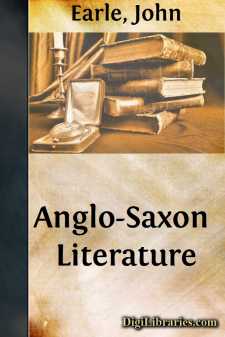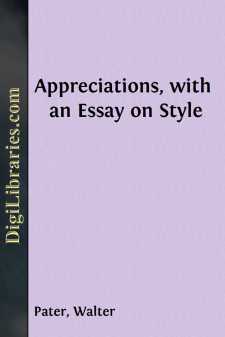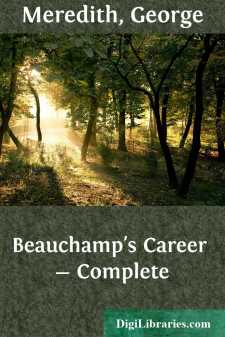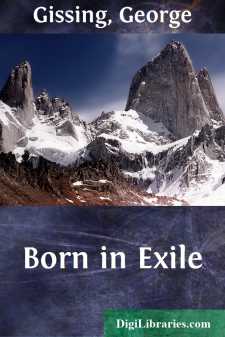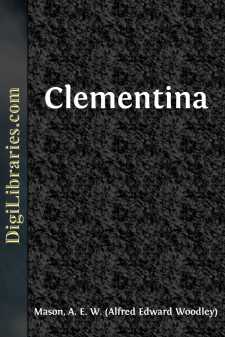Literary Collections
- American 84
- Ancient, Classical & Medieval 14
- Asian 1
- Australian & Oceanian 1
- Canadian 55
- Continental European 121
- English, Irish, Scottish, Welsh
- Essays 160
- General 24
- Letters 46
- Middle Eastern 1
English, Irish, Scottish, Welsh Books
Sort by:
by:
Andrew Lang
CHAPTER I: ADVENTURES AMONG BOOKS I In an age of reminiscences, is there room for the confessions of a veteran, who remembers a great deal about books and very little about people? I have often wondered that a Biographia Literaria has so seldom been attempted—a biography or autobiography of a man in his relations with other minds. Coleridge, to be sure, gave this name to a work of his, but he...
more...
by:
John Earle
CHAPTER I. A PRELIMINARY VIEW. Anglo-Saxon literature is the oldest of the vernacular literatures of modern Europe; and it is a consequence of this that its relations with Latin literature have been the closest. All the vernacular literatures have been influenced by the Latin, but of Anglo-Saxon literature alone can it be said that it has been subjected to no other influence. This literature was nursed...
more...
by:
Walter Pater
STYLE [5] SINCE all progress of mind consists for the most part in differentiation, in the resolution of an obscure and complex object into its component aspects, it is surely the stupidest of losses to confuse things which right reason has put asunder, to lose the sense of achieved distinctions, the distinction between poetry and prose, for instance, or, to speak more exactly, between the laws and...
more...
A MIST WRAITH The autumn afternoon was fading into evening. It had been cloudy weather, but the clouds had softened and broken up. Now they were lost in slowly darkening blue. The sea was perfectly and utterly still. It seemed to sleep, but in its sleep it still waxed with the rising tide. The eye could not mark its slow increase, but Beatrice, standing upon the farthest point of the Dog Rocks, idly...
more...
by:
George Meredith
CHAPTER I. THE CHAMPION OF HIS COUNTRY When young Nevil Beauchamp was throwing off his midshipman's jacket for a holiday in the garb of peace, we had across Channel a host of dreadful military officers flashing swords at us for some critical observations of ours upon their sovereign, threatening Afric's fires and savagery. The case occurred in old days now and again, sometimes, upon imagined...
more...
by:
Dornford Yates
HOW WILL NOGGIN WAS FOOLED, AND BERRY RODE FORTH AGAINST HIS WILL. "Who's going to church?" said Daphne, consulting her wrist-watch. There was a profound silence. My sister turned to Jill. "Are you coming?" she said. "Berry and I are." "I beg your pardon," said her husband. "Of course you're coming," said Daphne. "Not in these trousers. This is the...
more...
by:
John Galsworthy
Part IIAt the door of St. George's registry office, Charles Clare Winton strolled forward in the wake of the taxi-cab that was bearing his daughter away with "the fiddler fellow" she had married. His sense of decorum forbade his walking with Nurse Betty—the only other witness of the wedding. A stout woman in a highly emotional condition would have been an incongruous companion to his...
more...
by:
George Gissing
CHAPTER I The summer day in 1874 which closed the annual session of Whitelaw College was marked by a special ceremony, preceding the wonted distribution of academic rewards. At eleven in the morning (just as a heavy shower fell from the smoke-canopy above the roaring streets) the municipal authorities, educational dignitaries, and prominent burgesses of Kingsmill assembled on an open space before the...
more...
by:
George Meredith
CHAPTER I. WHEREIN AN EXCURSION IS MADE IN A CELTIC MIND A young Irish gentleman of the numerous clan O'Donnells, and a Patrick, hardly a distinction of him until we know him, had bound himself, by purchase of a railway-ticket, to travel direct to the borders of North Wales, on a visit to a notable landowner of those marches, the Squire Adister, whose family-seat was where the hills begin to lift...
more...
CHAPTER I The landlord, the lady, and Mr. Charles Wogan were all three, it seemed, in luck's way that September morning of the year 1719. Wogan was not surprised, his luck for the moment was altogether in, so that even when his horse stumbled and went lame at a desolate part of the road from Florence to Bologna, he had no doubt but that somehow fortune would serve him. His horse stepped gingerly...
more...



